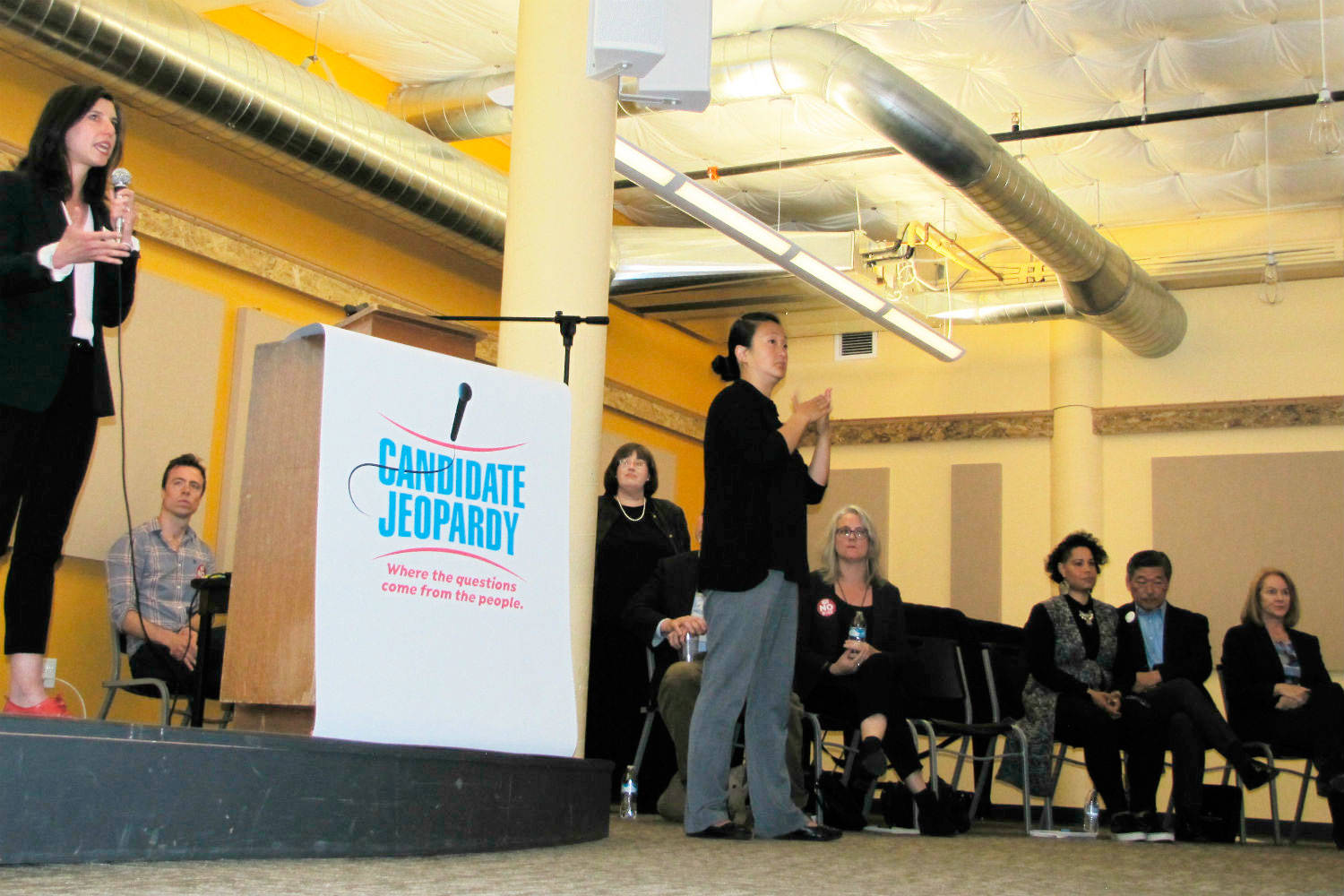More than 200 people packed into The Summit on Pike in Capitol Hill Wednesday night to see Seattle’s mayoral candidates play a game of Jeopardy! put on by Seattle Weekly and a number of community organizations, including the Greater Seattle Neighborhood Action Coalition, the American Muslim Empowerment Network (MAPS-AMEN), Nickelsville, and Anarchists of Seattle University. The forum, which also included a portion devoted to the Seattle City Council Position 8 race, had candidates blindly pick questions sourced from their could-be constituents, with a focus on traditionally marginalized communities. Unlike the nationally syndicated game show, this Candidate Jeopardy kept it simple and asked its questions in the form of a question.
You can watch all three-plus hours of the event here, but below are some quick takes on the forum.
Single family housing is in several candidates’ cross-hairs: Every candidate who addressed the issue of single-family zoning said it needed to be eliminated in favor of more dense housing across the city. That’s significant, considered that Mayor Ed Murray’s suggestion to do so proved to be a third-rail that damn near electrocuted him when he touched it. Critics of single-family zoning argue it creates de-facto gated communities by keeping land values inflated through restricting supply.
“We need to undo the racism that’s literally written into our land code,” said Jessyn Farrell.
“We need to change single-family housing zoning … That’s a great path toward home ownership,” Cary Moon said.
Two takes on HALA: Nikkita Oliver on several occasions argued that the city’s “affordable housing” plan is inadequate because if defines “affordable” at a rate that’s unrealistic for “black and brown people.”
“In Seattle, we have to transform what ‘affordable’ means,” Oliver said.
Jenny Durkan, meanwhile, took an opportunity to endorse Murray’s affordability plan, HALA, which largely relies on upzones paired with affordability requirements: “The beauty of HALA is, developers are in it to make money. HALA says we’ll give you something, let you go up a little more, but you have to provide affordable housing.”
Everyone (but a certain someone) hates the Chamber: If the night had a villain, it was the Chamber of Commerce, and by proxy, Jenny Durkan, who has received the Chamber’s endorsement.
“We need to call out the Chamber of Commerce and their influence in City Hall. We have the power; it’s time for us to push back,” said Moon.
“I’m not going to be the Vulcan candidate in this race. I’m not going to be the Chamber of Commerce candidate in this race,” Farrell added.
At the end of the forum, the candidates were asked who they’d support for mayor if they weren’t running themselves. Not one but two candidates—Mike McGinn and Moon—declined to endorse any of their opponents but said they would support whomever doesn’t have an endorsement from the Chamber of Commerce, i.e. not Durkan. And among those who did name a candidate they would support, Nikkita Oliver was the winner, continuing a tradition in this race of praising Oliver while trying to beat her in the election.
Durkan doesn’t know who’s giving her money: Durkan drew hisses from the crowd regarding her fundraising. One question asked each candidate if they have received contributions from corporations or developers. The question was fraught for Durkan, who has aforementioned support from Seattle’s business community and met with Vulcan shortly before announcing she’d run for mayor. She tried to sidestep the question by saying, “Corporations? I don’t know. I don’t look at the list,” before launching into boilerplate about how contributions do not influence policy. The crowd was not impressed, and let her know it. For what it’s worth, here is the list that Durkan’s not looking at. Corporations and developers are both on it.
The fundraising question allowed Mike McGinn to spin his middling fundraising performance into a positive. “I’m one of the worst fundraisers,” he, um, bragged.
Left-field comment of the night: While Durkan is often pegged as a cookie-cutter candidate, she provided what was arguably the most out-there policy argument of the night. Asked what issues Seattle doesn’t talk enough about, Durkan said self-driving cars. “Autonomous vehicles sound really cool, but they could cost millions of people their jobs.” She then asked people to envision a scenario where they’re waiting for a bus in the rain and have the option to take out their phone and “request an electric pod,” the point being that self-driving cars, if allowed unfettered access to Seattle, could cut into transit ridership. She’s probably correct on all points, but it still felt weird.
Everyone was on board with the income tax. Nikkita Oliver said she’d like to see the income threshold drop to $200,000 from $250,000. Cary Moon and Bob Hasegawa emphasized that the income tax was just the beginning, with Moon arguing that the city needs to find ways to tax wealth as well as income, and Hasegawa arguing that the city needs to find ways to tax corporations in a progressive matter, so that large companies pay a higher business and occupation tax rate than small businesses.
No one is on board with the youth jail: Not all candidates addressed it—one flaw of the event’s format is that it did not allow for every candidate to answer every question—but everyone who did said they opposed the youth jail proposal.
Bob Hasegawa was a Bernie Sanders delegate, and wants people to know it: Hasegawa quoted Sanders at least twice, by my count.
McGinn wants safe-consumption sites across the city: McGinn took a bold but risky stand on safe-consumption sites, saying that he not only supports the concept, but thinks the sites should be deployed throughout the city to ensure people who need them have access to them. “You do have to talk to the communities, but you have to be firm that you have these across the city,” he said.
The host was really funny: He’s also my boss.
dperson@seattleweekly.com








